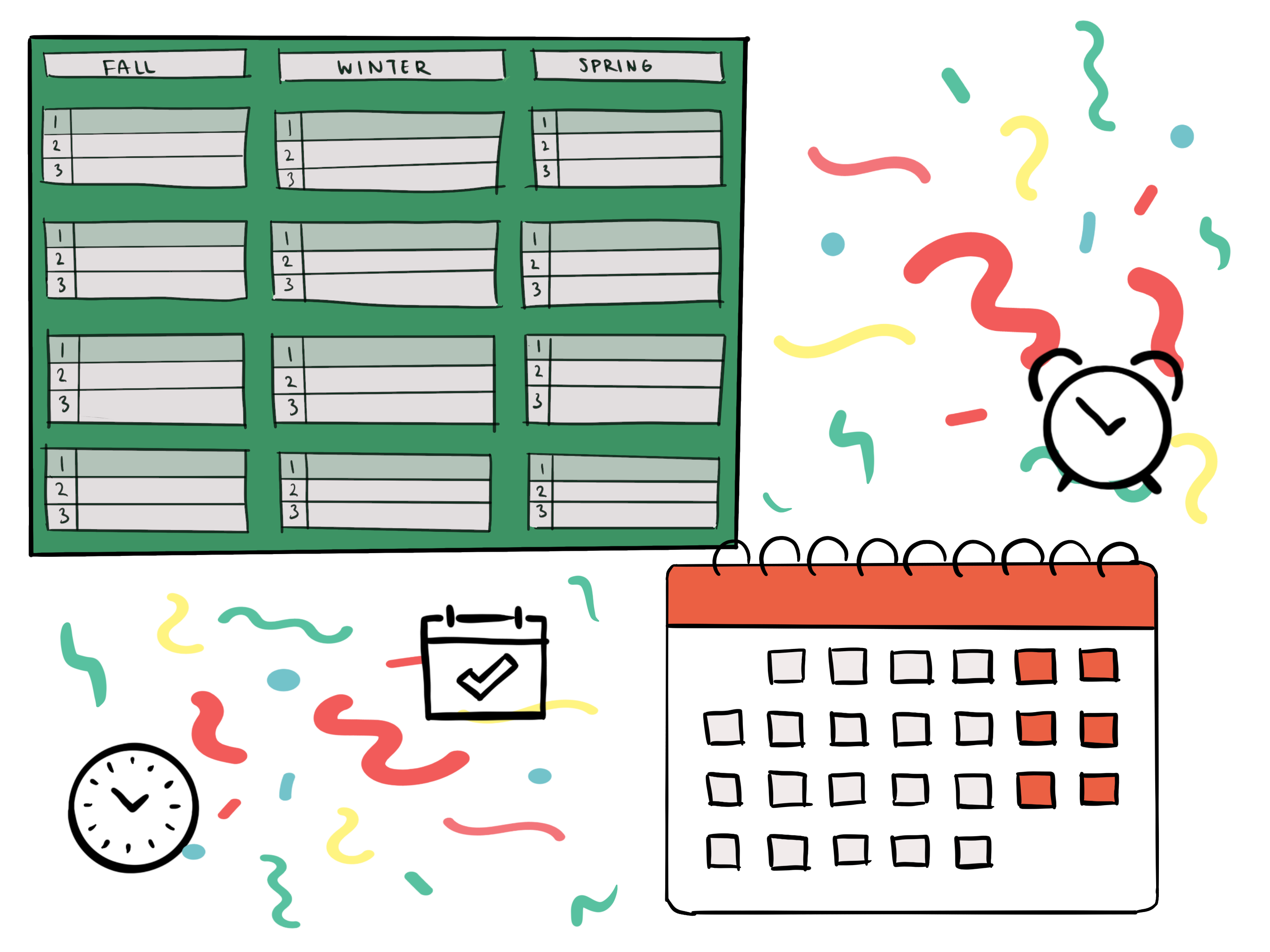Wednesday, April 2
Navigating Scheduling Day
Helen Chang ’26 in Features | April 12, 2024

Scheduling Day is a hectic time; picking classes that are rigorous enough and fitting while also managing a healthy work-play balance can be difficult for students. Students in different forms, Katie Axelsen ’24, Busola Babatunde ’25, and Chris Hu ’26 share their experiences and the unique questions they thought about while choosing courses.
During her V Form year, Axelsen has taken several interesting electives, including “Radical Love in African American Literature” taught by Victoria Stitt and “Botany & Boat Building” with Johnny Clore H’02. In the Fall Term with Stitt, she learned about how love, feminism, sexism, and racism impacted our society. Axelsen enjoyed “the four books [she] read” and seeing how “the way people think changed in different communities.” In addition, “[her] classmates helped [her] learn deeper” during Harkness discussions and by opening up different ways of interpretation. Now in the Spring Term, she is taking the interdisciplinary course, “Botany & Boat Building.” Axelsen is learning about “different types of trees and plant phenology” while building a canoe. In this process, she is also learning about “the history of the canoe and its culture” and how to be careful to use the right materials. Although she has canoed for 10 years now, she had no idea how a canoe was built before this class.
Picking classes for the V Form year is arguably the toughest task on Scheduling Day. Babatunde, trying to be aware of her other time commitments as a rising V Former, “mainly [picked her] favorite subjects,” but there were also certain graduation requirements she needed to considered. Many of her desired courses are only offered during a specific term, which “caused some difficulty when forming a schedule.” The only course Babatunde recommends is the popular “A History of American Democracy in Cases.” Despite the class coming with lots of homework and much time commitment, Babatunde described it as “an interesting class” that doesn’t require “memorizing dates or proper nouns,” but also feels rewarding after successfully learning the material and understanding new court cases. When figuring out what class to take, Babatunde encourages students to “talk to teachers and different arrays of students,” as “people might find certain classes harder than others.” At the end of the day, however, “everything should be taken with a grain of salt,” and each student should think about their individual workload while considering what subjects are one’s forte. Babatunde cautions others when asking upperformers for their advice: “Make sure to get a fully unbiased opinion of a class and ask people who genuinely have your best interest at heart.”
As a student-athlete who wants to prioritize both fencing and academics, Chris Hu had one thing in mind while picking classes: balance. He wanted to “pick classes with lighter workloads that still challenged [him].” As a III Former with little experience choosing classes, he relied on upperformers’ suggestions. For history, he specifically referred to “Ava Martoma ’25 advertising classes like ‘American Democracy in Cases,’” but he also wanted to take ‘U.S. History Survey’ based on Kiah Smith’s ’25 recommendation. When looking through the course catalog, he diligently read through each course description, looking for “the most interesting” course in the department. Naturally, every upperformer has different experiences and opinions; subsequently, juggling contrasting words of wisdom has been on Hu’s mind for the scheduling day experience.
Interdisciplinary classes can be a great way to steer away from typical Lawrenceville classes, and reach out to expand your class palette instead. With upperformers passing down their experiences, underformers can have an idea of some courses that previous Lawrentians have enjoyed.
Related Articles
- Chill Fashion: Tips from the Pros Michael Meng ’26
- Making the Most of Consultation Michael Meng ’26
- Behind the Scenes of School Meeting Performances Isabelle Lee ’27
- Sundays @ Lawrenceville Bunny Henault-Bassett ’26
- Little Women Adaptations and American Feminism Mira Ponnambalam ’26
Recent Articles
- Trump Installs Himself as Chairman of the Kennedy Center Jane Shindnes ’26
- You Have Bewitched Me, Movie and Book: The Evolution of Pride and Prejudice Celestine Sutter ’27
- Second Form Shakespeare Preview: Julius Caesar Presented by the Class of 2028 Esha Desai ’28
- The Arts Celebrated during Lawrenceville’s Black History Month Melina Kyriakopoulos ’27
- How has “Being Woke’’ Become so Controversial? Mara McKithen ’28